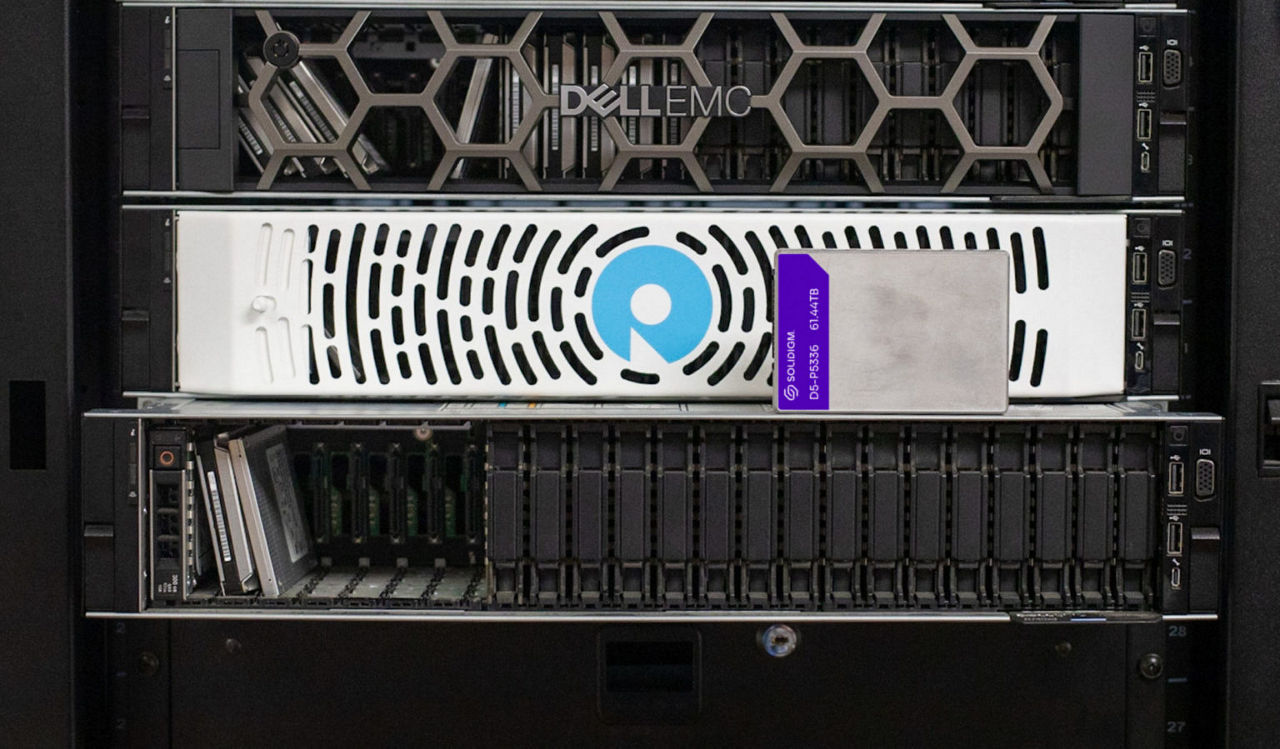Solidigm D5-P5336 61.44TB SSD Review
Summary of Lyle Smith Storage Review article

In a recent in-depth review of the new Solidigm D5-P5336 SSD, Storage Review performed a series of comprehensive benchmark tests with impressive results, giving the D5-P5336 a “Best Of” nod for 2023. In this summary, we’ll take a look at Storage Review’s findings.
The bottom line: For data centers looking to drive down costs, especially in read-intensive environments, “the P5336’s high storage capacity, strong performance profile, and QLC-driven density advantages make it a compelling proposition in the competitive landscape in today’s data-intensive world.”
D5-P5336 performance: Testbed and comparables
For synthetic benchmarks and application tests, Storage Review employed a Lenovo ThinkSystem SR635 with the following specifications:
- 1 x AMD 7742 (2.25GHz x 64 Cores)
- 8 x 64GB DDR4-3200MHz ECC DRAM
- CentOS 7.7 1908
- ESXi 6.7u3
In each test, the D5-P5336 was compared against the Micron 6500 ION (30.72TB), the Solidigm D5-P5316 (30.72TB), and the Solidigm D5-P5316 (15.36TB).
D5-P5336 performance: VDBench workload analysis
All of Storage Review’s tests leveraged the standard vdBench workload generator, which uses scripting engine to automate and capture results over a large compute testing cluster. This allows for effective workload repeatability across a wide range of storage devices.
D5-P5336 Performance: Results
Across an array of over 10 tests, the Solidigm D5-P5336 outperformed all other tested drives in read-intensive benchmarks, while also outperforming all other tested Solidigm drives in every benchmark. You can find a summary of Storage Review’s test results in the sections below.
Random read and write
- For the 4K random read benchmark, the D5-P5336 clocked in just under 1 million IOPS (999 IOPS) at a latency of 509.4µs. This placed it right behind the Micron 6500 ION and ahead of all other tested Solidigm drives.
- For the 4K random write benchmark, the D5-P5336 hit a relatively moderate peak of 106K IOPS with a latency of 4,823µs, putting it ahead of both Solidigm D5-5316 drives.
- For the 64K sequential read benchmark, the D5-P5336 performed exceptionally well, peaking above all other tested drives at an impressive 7.11GB/s (114K IOPS) with a latency of 565.8µs.
- For the 64K sequential write benchmark, the D5-P5336 posted 2.5GB/s write (34K IOPS) at with a latency of 1,869µs, placing behind 6500 ION but ahead of all other tested Solidigm drives.
- For the 64K random read benchmark, the D5-P5336 posted an impressive 88K IOPS (at 5.51GB/s) with a latency of just 362µs, putting it well ahead of all other tested drives.
- For the 64K random write benchmark, the D5-P5336 hit a peak of 33K IOPS (2.1GB/s) with 469.7µs, placing it ahead of all other tested Solidigm drives but behind the Micron 6500 ION drive.
SQL benchmarks
- For the SQL benchmark, the D5-P5336 hit a peak of 249K IOPS with a latency of 127.5µs.
- For the SQL 90-10 benchmark, the D5-P5336 hit a peak of 239K IOPS with a latency of 132.4µs.
- For the SQL 80-10 benchmark, the D5-P5336 hit a peak of 227K IOPS at a latency of 139.4µs.
In these three tests, it performed at parity or out-performed all other tested drives.
VDI benchmarks
- For the first VDI Full Clone (FC) Boot benchmark, the D5-P5336 hit a peak of 196K IOPS with a latency of 137.8µs.
- For the VDI FC Initial Login benchmark, the D5-P5336 hit a peak of 86K IOPS with a latency of 345.1µs.
- For the VDI FC Monday Login benchmark, the D5-P5336 hit a peak of 92K IOPS with a latency of 170µs.
- For the VDI Linked Clone (LC) Boot benchmark, the D5-P5336 hit a peak of 88K IOPS with 180.9µs latency.
- For the VDI LC Initial Login benchmark, the D5-P5336 markedly outperformed all other drives, peaking at 52K IOPS with a latency of approximately 149.1.8µs.
- For the VDI LC Monday Login benchmark, the D5-P5336 again came out on top, peaking at 71K IOPS with a latency of 220.3µs.
Conclusion
Thanks to capacities ranging from 7.68TB to a “staggering” 61.44TB with availability in three different form factors (U.2 15mm, E3.S 7.5mm, and E1.L 9.5mm), the D5-P5336 “continues to push the density boundaries of data center storage capabilities” while “giving data centers increased flexibility and compatibility at better overall cost,” Storage Review concludes. Regarding capacity specifically, the review states that the D5-P5336 is “in a league of its own.”
On the performance side, the Storage Review’s tests showed that the D5-P5336 excelled in read-heavy workloads benchmarking and delivered solid performance for smaller, mixed-unit workloads.
With high capacity, high flexibility, and high performance in crucial benchmark tests, the D5-P5336 is championed by Storage Review as “a compelling choice for organizations seeking a storage solution that can handle the challenges of a data-intensive world.” In closing, Storage Review adds: “It’s also one of the best things we’ve seen all year, earning a ‘Best Of’ nod for 2023.”
Read the full Storage Review article, written by Lyle Smith, for details.